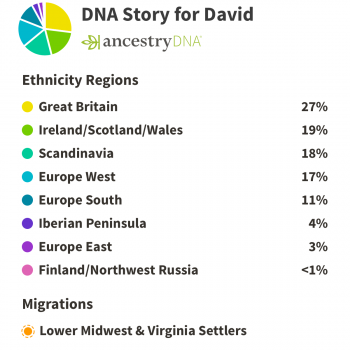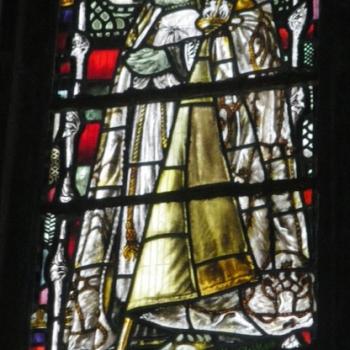David Russell Mosley
Ordinary Time
5 November 2015
The Edge of Elfland
Hudson, New Hampshire
Dear Friends and Family,
I apologize for my lack of communication over the past month. I’ve had to submit my thesis corrections (I’m still waiting to hear back on the results), and I’ve had some other life things come up. But enough with excuses! I will endeavor to return to a regular posting schedule of at least twice a week.
Lately at the church my wife and I attend many of the sermons have had a very focused attention on evangelism. This isn’t something unique to the church we currently attend. I think I can safely say that with one or two exceptions every church I have attended has had a profound emphasis on evangelism, that is telling people who don’t believe in Jesus about Jesus in order to bring them into the fold of belief in Jesus. Some churches even go so far as to suggest that evangelism is the primary thing Christians are meant to be doing. Now I want to be clear, I am not against evangelism. Of course part of being a Christian is to “make disciples of the nations.” But I want to challenge the idea that this is the primary thing Christians are called to do.
First, I want to look at the primary passage we go to for seeing evangelism as the primary purpose of the Christian, Matthew 28.17-20. Jesus has been raised from the dead and these are his final words, in this Gospel, to his followers:
And Jesus came and said to them, “All authority in heaven and on earth has been given to me. Go therefore and make disciples of all nations, baptizing them in the name of the Father and of the Son and of the Holy Spirit, teaching them to observe all that I have commanded you. And behold, I am with you always, to the end of the age.”
We often call this passage The Great Commission, but it should be remembered that it only exists in Matthew’s Gospel and Mark’s (though many scholars believe the Great Commission portion of Mark’s Gospel is a later addition). Luke’s Gospel does not include any kind of commissioning other than to wait in Jerusalem until they clothed with power from on high and John’s Gospel ends with Christ’s commands to Peter to feed his sheep and follow him. Acts does begin with Christ calling on the 120 disciples to be his witnesses in Jerusalem, Judea, Samaria, and the ends of the world. So we have this odd mix of Gospels ending, and Acts beginning, with some calling on the disciples, and therefore us, to be witnesses to the reality of God Incarnate, of God Crucified, of God Resurrected, and of God’s Return. So this is clearly important, but it is to be the central focus for Christians, the primary thing we’re meant to dedicate our lives to? It seems to me that the rest of the New Testament does not bear that out.
First, we should keep in mind that even the Matthew passage part of what the disciples are called on to do is teach “them to observe all that I have commanded you.” I don’t think this limited to making disciples, but all the commands Jesus has given, including, “be perfect as your heavenly Father is perfect.” Which brings me to what I think is central: deification. For those who have kept up with the topic of my PhD thesis, you’ll know that I worked on the subject of deification and human creativity. Deification means being so unified to the Triune God through Christ and the Spirit that we may be called gods (although that by adoption/grace and not by nature). We could, to a certain extent, also call this holiness or even perfection. This is the thing to which we have been called and the reason for which we have been created, to be united to the Divine Life.
Paul’s letters bear this out. When you read through them you see that Paul spends little to no time about how believers should go about converting unbelievers, about how we should evangelize (although he does spend time concerning his own efforts in spreading the Gospel). Rather he spends most of his time concerned with our individual corporate holiness: how we conduct ourselves as individual Christians and as the Church. Paul calls us to strive towards the goal, which isn’t to evangelize as many people as we possibly can, but to come into that deified life in Christ.
It is for this reason that the early and medieval Church spends so much time on topics like contemplation, which in essence means times of intense thinking about and entering into the presence of God. This is the foundation of the Christian life, entering into the divine life through the incarnation of the Son and the indwelling of the Spirit. It is from this place of working toward our deification, which can only be done in and with the grace of God, that all other aspects of Christianity flow: like evangelism, social justice, human creativity, and more. The Christ event transfigures how we see the world around us and forces us to begin by doing more than simply assenting to a relationship with Christ, but to actually begin (or more rightly continue) the deifying process which is first and foremost about our transfiguration into Christ by being adopted into his Sonship. The natural outflow of this will include concern for the non-believer and for the poor and oppressed.
You see, I’m concerned. I’m concerned about the churches who make evangelism the main point of being a Christian. I’m concerned that making evangelism the central point of Christianity will lead to shallow Christians. I’m concerned it will lead to Christians who are like the seeds sown on the rocky soil, they will accept the Gospel with eagerness but will be burnt by the sun because they lack roots. It is of course true that there are problems with focusing only on personal or even corporate holiness (especially when done so without love and mercy) or only on the social or creative aspects of Christianity. However, I think the foundation must be in deification, in holiness. We must found ourselves in the reason God created us in the first place, namely to be joined to him in love. God did not create humanity to evangelize (since that require people created who needed evangelization). Neither did he create us to right the wrongs in society (since that would require societies existing in sinfulness before sin entered the world). God created humanity to be joined to him first and foremost, everything else we do is intended to facilitate that end. So I’m not calling us to stop evangelizing, far from it. What I am calling us to is a return to a foundational emphasis on the end for which we were created so that we may participate with God in bringing about our own salvation and deification and in order to transform this world to bring it into a deifying relationship with God. But we must start with our personal and corporate holiness, that must be our base of operations from which we go out to transform the world.
Sincerely yours,
David











